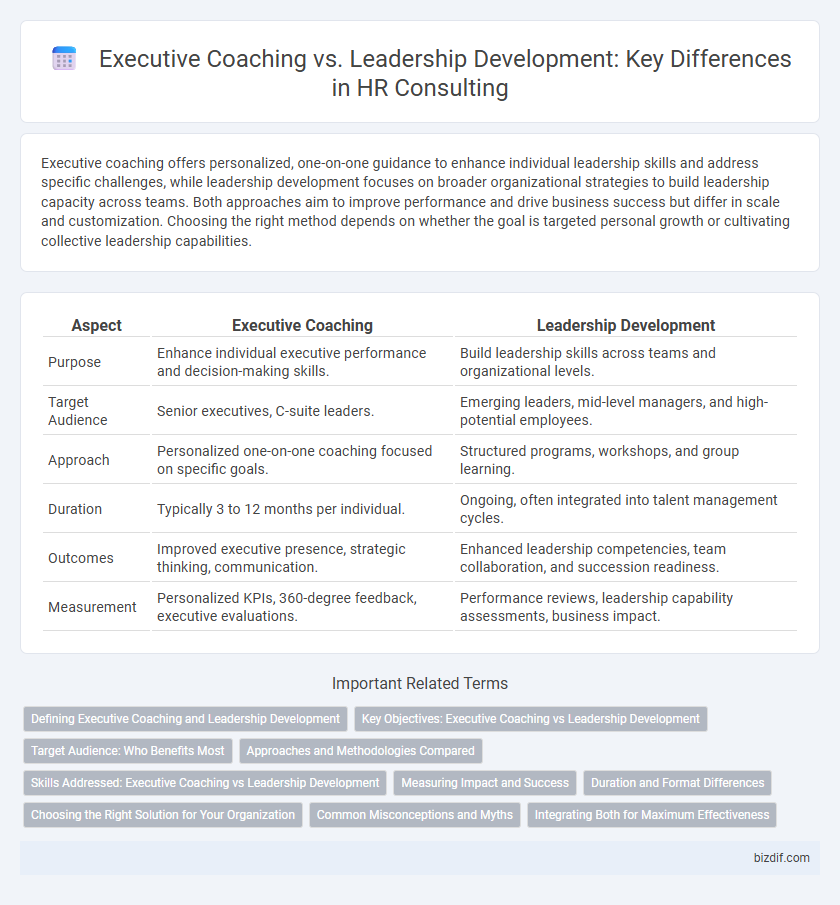Executive coaching offers personalized, one-on-one guidance to enhance individual leadership skills and address specific challenges, while leadership development focuses on broader organizational strategies to build leadership capacity across teams. Both approaches aim to improve performance and drive business success but differ in scale and customization. Choosing the right method depends on whether the goal is targeted personal growth or cultivating collective leadership capabilities.
Table of Comparison
| Aspect | Executive Coaching | Leadership Development |
|---|---|---|
| Purpose | Enhance individual executive performance and decision-making skills. | Build leadership skills across teams and organizational levels. |
| Target Audience | Senior executives, C-suite leaders. | Emerging leaders, mid-level managers, and high-potential employees. |
| Approach | Personalized one-on-one coaching focused on specific goals. | Structured programs, workshops, and group learning. |
| Duration | Typically 3 to 12 months per individual. | Ongoing, often integrated into talent management cycles. |
| Outcomes | Improved executive presence, strategic thinking, communication. | Enhanced leadership competencies, team collaboration, and succession readiness. |
| Measurement | Personalized KPIs, 360-degree feedback, executive evaluations. | Performance reviews, leadership capability assessments, business impact. |
Defining Executive Coaching and Leadership Development
Executive coaching is a personalized, one-on-one approach designed to enhance the skills, mindset, and performance of senior leaders through tailored feedback and goal-setting. Leadership development involves broader programs and initiatives aimed at cultivating leadership capabilities across multiple levels within an organization to drive long-term business success. Both strategies play crucial roles in strengthening organizational leadership but differ in scope, customization, and target audience.
Key Objectives: Executive Coaching vs Leadership Development
Executive coaching focuses on personalized development goals aimed at enhancing individual leaders' performance, emotional intelligence, and decision-making skills. Leadership development encompasses broader organizational initiatives designed to cultivate leadership capacity, align leadership behaviors with company strategy, and prepare high-potential employees for future leadership roles. Key objectives of executive coaching prioritize tailored skill enhancement and accountability, while leadership development emphasizes scalable programs fostering succession planning and cultural transformation.
Target Audience: Who Benefits Most
Executive coaching primarily benefits senior executives and high-potential leaders seeking personalized growth and strategic decision-making skills. Leadership development programs target mid-level managers and emerging leaders aiming to build foundational competencies and team management capabilities. Organizations with diverse leadership tiers invest in both approaches to ensure tailored skill enhancement aligned with career stages.
Approaches and Methodologies Compared
Executive coaching employs personalized, one-on-one sessions tailored to individual strengths and challenges, utilizing techniques such as 360-degree feedback and goal-setting frameworks to foster rapid personal growth. Leadership development adopts a broader, group-oriented approach, integrating workshops, peer learning, and competency models designed to build organizational leadership capacity over time. Both methodologies emphasize measurable outcomes but differ in scope and delivery, with executive coaching targeting specific executive roles and leadership development focusing on scalable leadership skills across multiple levels.
Skills Addressed: Executive Coaching vs Leadership Development
Executive coaching targets personalized skill enhancement such as decision-making, emotional intelligence, and strategic thinking tailored for individual executives. Leadership development programs focus on broader team-based competencies including communication, conflict resolution, and organizational change management. Both approaches improve leadership effectiveness but differ in scope and customization, with executive coaching emphasizing one-on-one skill refinement.
Measuring Impact and Success
Measuring impact in executive coaching relies on individualized performance metrics such as goal attainment, behavioral changes, and feedback from key stakeholders, which reflect personal growth and decision-making improvements. Leadership development programs are assessed through broader organizational KPIs including employee engagement scores, leadership pipeline strength, and retention rates, indicating systemic cultural shifts. Utilizing 360-degree feedback tools and ROI analysis helps quantify success, aligning coaching results with business objectives and long-term leadership effectiveness.
Duration and Format Differences
Executive coaching typically involves one-on-one, personalized sessions over a shorter, intensive period ranging from three to six months, tailored to address specific leadership challenges and goals. Leadership development programs are often broader, designed for groups, and extend over several months to a year, combining workshops, training modules, and continuous learning. The format difference emphasizes individualized coaching contrasts with the cohort-based, curriculum-driven approach of leadership development initiatives.
Choosing the Right Solution for Your Organization
Executive coaching provides personalized, one-on-one support to enhance an individual leader's skills and performance, while leadership development focuses on building capabilities across teams or the entire organization. Selecting the right solution depends on your organizational goals, the current leadership gaps, and whether tailored guidance or broad skill-building interventions are needed. Assessing factors such as employee readiness, resource allocation, and desired outcomes ensures an effective alignment between executive coaching and leadership development programs.
Common Misconceptions and Myths
Executive coaching is often misunderstood as simply leadership training, but it focuses on personalized, one-on-one support to enhance individual performance and self-awareness. Leadership development programs are mistakenly viewed as a quick fix, whereas they involve comprehensive strategies to build skills across teams and organizational levels. Both approaches are essential; executive coaching hones executive potential while leadership development fosters broader cultural and behavioral change within companies.
Integrating Both for Maximum Effectiveness
Executive coaching offers personalized guidance to enhance individual leadership skills, while leadership development programs focus on building competencies across teams or organizations. Integrating these approaches creates a synergistic effect, aligning personal growth with strategic organizational objectives for maximum impact. Companies leveraging both experience improved leader performance, higher employee engagement, and sustainable business results.
Executive Coaching vs Leadership Development Infographic

 bizdif.com
bizdif.com